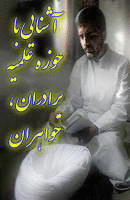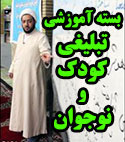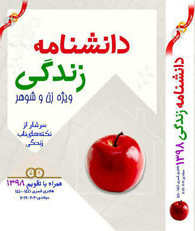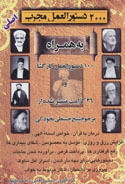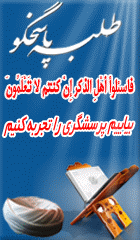The Nature of Jesus 1
The Nature of Jesus 1
Many Muslim writers when writing about Jesus, inevitably deal with him in negatives (as in 'he is not the son of God', etc.). The Muslims have spent a good deal of time debating these aspects of Jesus using Christian theology as a starting point. Due to this, the Christian community really does not know what or who exactly Christ is in purely Islamic terms.
A principal factor underlying this misapprehension is the fact that these two faiths take vastly different approaches to some of the most fundamental questions of religion. For example, the question of the essential nature of man, the nature of God, and how the redemption of man and his reconcilement with God is to be achieved. The Islamic position on Jesus can never be understood through attempts to disprove the Christian claims concerning Jesus - this method will only give one a picture of what Jesus is not.
Only by placing him within the theological context of Islam is it possible to gain some insight into Jesus. This paper will attempt to portray the Islamic view of man and God, and the position of Jesus within the Islamic world view. The point of departure, and the point of orientation, the point against which all things are measured in Islam, is God (who is One and Indivisible). The Qur'an says: "Say, He is God, the One and Only, The Eternal, Absolute; He begets not, Nor is He begotten; And there is none like unto Him."(1)
The foundation of Islamic belief then, is the belief in the absolute oneness, unity, and uniqueness of God. "God the Ultimate reality is One, and everything other than God comes from God and is related to Him. No true understanding of anything is possible unless the object in view is defined in relationship to the Divine. All things are centered on God."(2)
All other things seen or unseen are his signs (ayat) and act as witnesses to His existence. All things in the universe are manifestations of His, all are from Him. Man enjoys a very important role in this cosmos. Although all things are made by God and identified with God in as much as their being created by Him, man is one who houses a part of God within him. In the Qur'an God says He has breathed His spirit into man.
"When thy Lord said unto the angels: lo! I am about to create a mortal out of mire, And when I have fashioned him and breathed into him of My Spirit, then fall down before him prostrate.(3) This verse provides essential insights into man's position and nature in this universe. Firstly it says that man is made of a dual nature. He is part earth and part divine spirit. Of the portion that is earth, the Qur'an calls it a stinking clay. There are two opposing forces within man, one which is totally animal, material, carnal, and unclean (clay) and the other is the purest essence - the spirit of God.
"Hence human beings represent a mixture of clay and spirit, darkness and light, ignorance and knowledge, activity and passivity ... all divine attributes are present in man, but they are obscured by those dimensions of existence that manifest a lack of the same divine attributes."(4)
A lack of divinity would mean a lack of understanding and knowing what is divine. It is the innermost spirit that is the only part of a human that can in some sense perceive that divine reality, as it is essentially a part of it. The rest of man is a curtain between him and God. It is the partition between the spirit and the mirror of the spirit. It is with these tensions within his nature that the first man (Adam) was created.
The "clay" aspect causes him to "incline towards the earth". The spirit aspect draws him towards God. For this reason the Qur'an says that Adam was created with the two hands of God's power. One hand represents the attributes (or names) of God that draw man near to God (e.g., mercy, love, compassion etc.). The other hand represents the attributes of distance and wrath (e.g., anger, vengeance, wrath, etc.), those qualities which separate man from God. "The most invisible dimension of the human being reflects the divine light directly, while the bodily or visible dimension reflects it only dimly or not at all."(5)
Man has to pull aside this veil of the corporeal or material self. Shunning it he is able to let his invisible dimension reflect the light that it so wants to see. This spirit of God which resides in man longs for a reunion with its original, it cries and makes man's soul restless to cleanse itself of all that is not God. As man lays away his corporeal vestments his inner being sees more clearly. It gains a vision which sees what was previously unseen. Gates of knowledge are opened up to it and before this man will be laid out the secrets of the control of the Universe. The distance between man and God has been bridged by such men.
"My servant continues drawing near to Me ... until I love him, and when I love him, I am the Hearing through which he hears, the Sight through which he sees, the Hand through which he grasps, and the Foot through which he walks."(6)
Continue in the next article: ( The Nature of Jesus 2 )
NOTES:
1. (The Qur'an. Ch. 112)
2. (Chittick, William. Article, 'The Concept of Human Perfection.' from, The World & I. New York; News World Communications. Feb. 1991. pg. 500)
3. (The Qur'an. Ch 38- vrs 72&73)
4. (Chittick, William. Article, 'The Concept of Human Perfection.' from, The World & I. New York; News World Communications. Feb. 1991. pg. 502)
5. Ibid
6. (Hadith Qudsi)
مطالب مشابه با این موضوع:
وبگــــــــــردی طلبۀ پاسخگو
- فایل اعمال و رفتار های خلاف قانون جناب آقای حسن روحانی
- در کنج خانه طلبهها چه میگذرد؟
- سکوت چند ساله مسئولان حوزه در قبال حملات وحشیانه به طلاب!
- می گویند که مملکت مملکت آخوندهاست!!
- یک ماجرای تلخ که خانم ها با تأمل بیشتر بخونند
- جریان های تکفیری موجود در عراق و نحوه شکل گیری آنها
- سیر تکاملی تفکر سلفیه چگونه بوده است؟
- بداء در قرآن و حدیث چگونه مطرح شده است؟
- پیامبر (ص) با مخالفین خود چگونه بر خورد می کرد؟
- سبک زندگی حضرت زهرا سلام الله علیها
- ملاک کرامت و شرافت افراد، انسانیت است یا جنسیت؟
- رنگ و پوشش های رنگی در اسلام
- حجاب، زنان را افسرده میکند و مانع پیشرفت اجتماعی آنهاست!!!
- علوم لدنی معصومین
- مگر ولی فقیه معصوم است که ولایت مطلقه دارد؟
- اگر خدا ازعاقبت ما اطلاع دارد قیامت برای چیست؟
- آیا بجای نماز خوندن، پیانو یا سه تار بزنم؟
- چرا مراسم عزاداري امام حسين(ع) پيش از شهادت ايشان صورت ميگيرد؟
- چرا امام حسين(ع) در كربلا براي رفع تشنگي از خداوند طلب باران نكرد؟
دانــــــلود های مفیـــــــــــــــــــد
- دانلود پاورپوینت شناخت وهابیت و صهیونیسم و ارتباط با همدیگر
- دانلود دو پاورپوینت اجرای عید غدیر خم
- دانلود پاورپوینت احتجاج اميرمؤمنان (ع) به غدير
- پژوهشی در کلام و پیام مقام معظم رهبری پیرامون ماه رمضان
- خطبه شعبانیه و خطبه امیرالمومنین(علیه السلام) پیرامون روزه و ماه رمضان
- دانلود پاورپوینت و pdf تفاوت های زن و مرد
- دانلود جزوه ساعات سعد و نحس(زمان نوشتن دعا)
- تقویم مذهبی شمیم یار 96 مخصوص کامپیوتر
- دانلود نرم افزار «شیعه شناسی»
- دانلود پاورپوینت ساختار خانواده و مسایل آن
- دانلود کتاب دایره المعارف جنسی
- دانلود نکات جذاب دوران عقد
- دانلود کتاب درمان سرد مزاجی و بی میلی جنسی بانوان
- دانلود کتاب حسادت کودکان
- دانلود کتاب درمان خستگی وناتوانی جنسی
- دانلود پاور پوینت اسیب های ازدواج وخانواده
- دانلود پاورپوینت هشت گام برای تحقق رویا به واقعیت
- دانلود پاورپوینت تقویت اراده
- دانلود پاورپوینت موفقیت وروشهای رسیدن به ان
- دانلود پاورپوینت هنر رفتار با افراد دشوار
- دانلود پاورپوینت جملات جالب وجذاب روحیه بخش بزرگان
- دانلود پاورپوینت راههای مقابله ودرمان استرس
- دانلود پاورپوینت نیازهای اساسی کودکان
منبــــرهای مکــــــــــــــــــتوب
- منبر مکتوب: روز عرفه و فرصت ها
- منبر مکتوب: سبک زندگی امام باقر علیه السلام
- منبر مکتوب: سه نیاز مومن (امام جواد علیه السلام)
- سخنرانی سلسله ای و چند جلسه ای مناسبت ماه رمضان
- دانلود 30 جلسه سخنرانی ماه مبارک با موضوع تنها مسیر
- موضوعات پیشنهادی سخنرانی برای محرم
- فضائل حضرت قمر بنی هاشم علیه السلام
- برکات وجود ابا عبدالله علیه السلام بر عالم
- بررسی بُعد اخلاقی،عبادی و عرفانی عاشورا
- آخرين وصيت امام حسين عليه السلام
- اولین علت رویاروی در کربلا؛ دوری از یاد خدا
- هميشه حزن؟ شادي چرا نه؟ - شب دهم محرم
- چرا نفرين ؟ - شب نهم محرم
- نماز ظهر عاشورا - شب هشتم محرم
- فلسفه عزاداری - شب هفتم محرم
- دفاع از دین - شب ششم محرم
- فلسفه حضور خانواده سيد الشهداء - شب پنجم محرم
- علم امام علیه السلام به شهادت - شب چهارم محرم
- فقدان شرایط امر به معروف و نهی از منکر- شب سوم محرم
مناظرات طلبه پاسخگو
جدیدترین های زبان انگلیسی
- Islam and Its Social System
- Duties of Man Towards the People
- Islam Various Systems
- Attributes of The Real Follower of Imams in Their Teachings
- Who is a Real Shia Muslim?
- RIGHTS OF SCHOLARS
- Islam Attacks Slavery 1
- The Advantages of Religion 2
- The Clearest Reason for Free Will
- Sheikh Zakzaky to be released on bail
- Brief History of Religions
- Is It Necessary For Man To Follow A Religion?
- The Advantages of Religion 1
- Who Is Almighty Allah?
- What are the differences between Shia and Sunni Muslims؟
- The Rights Islam Offers to Women
- How I find that Islam does not Oppress Women?
- URGENT MEDICAL TREATMENT FOR SHEIKH ZAKZAKY
- The motto of this year’s book fair is “Reading Is Ability”.
- Fundamental principles of Islam
بیشترین دانلود ها
- دانلود صوتي تکنیک های نزدیکی زن و شوهر (108233)
- دانلود رایگان کتاب خواص سوره های قرآن (55164)
- دانلود پاورپوینت بسیار مفید مهارت های زندگی (37739)
- دانلود پاورپوینت و pdf تفاوت های زن و مرد (34382)
- دانلود كتاب مسائل جنسي و زناشوئي در احاديث (33999)
- دانلود کتاب دایره المعارف جنسی (32440)
- دانلود پاورپوینت های آموزش پیش از ازدواج (30818)
- دانلود بسیار مفید پاورپوینت آئین همسرداری (30240)
- دانلود 110جلد کتاب بحارالانوار علامه مجلسی ره (29895)
- دانلود پاورپوینت آموزشی بررسی رابطه دختر و پسر (29874)
- دانلود كتاب دختران خوب به آسمان می روند دختران بد به همه جا (28782)
- دانلود کتاب درمان سرد مزاجی و بی میلی جنسی بانوان (28585)
- دانلود کتاب آموزش جنسی آقایان (28545)
- دانلود كتاب فرق و مذاهب كلامي استاد رباني گلپايگاني (28485)
- دانلود نکات جذاب دوران عقد (28129)
- دانلود نرم افزار «شیعه شناسی» (26501)
- دانلود کتاب درمان خستگی وناتوانی جنسی (25674)
- دانلود پاورپوینت تقویت اراده (24139)
جدیدترین مطالب سایت
- پاسخ به شبهات ولایت (4793) بازدید
- پاسخ به شبهات ولایت (4593) بازدید
- اذان در جامعه اسلامی نماد چیست ؟ و چرا فقط سه بار در روز تکرار می شود ؟ (3959) بازدید
- باتوجه به عادل بودن خداوند چرا بعضی از انسانها را ناقص الخلقه آفریده است ؟ (4037) بازدید
- ویژگی خاص قرآن چیست که کسی نمی تواند مانند آن را بیاورد ؟ (4325) بازدید
- با توجه به ترک خود ارضایی عوارض آن هنوز در من هست چگونه آن را برطرف کنم ؟ (5683) بازدید
- آیا بدن اخروی مانند بدن مادی است ؟چهره ی واقعی انسان در قیامت چگونه است ؟ (5139) بازدید
- آیا ادعای ملاقات امام زمان (عج) از جانب برخی افراد صحت دارد ؟ (4626) بازدید
- چرا به اصول و قواعد دین اسلام توجه نمی شود و پذیرش آن از سوی پیروان ادیان دیگر سخت است ؟ (5012) بازدید
- فلسفه وجود لباس روحانیت در عصر حاضر چیست ؟ (3609) بازدید
- آیا وظیفه یک روحانی تنها راهنمایی مردم و فعالیت و تدریس در حوزه هاست ؟ (2999) بازدید
- آیا نظریه تناسخ از دیدگاه اسلام پذیرفته شده است ؟ (5375) بازدید
- آیا توصیف بهشت و جهنم در قرآن تمثیل هایی برای درک بهتر آن جهان است ؟ (4968) بازدید
- با توجه به اینکه اسلام کاملترین دین هست چرا ما نسبت به کشور های غیر مسلمان عقب مانده تر هستیم ؟ (6891) بازدید
- نقش امام و رهبر در جامعه اسلامی چیست ؟ و اگر نباشد چه اتفاقی می افتد ؟ (4647) بازدید
پربازدیدترین های سایت
- زنی هستم که میخواهم به شوهرم خیانت کنم!!! (605561)
- آيا زن شوهر دار بخاطر رفع نیاز جنسی اش ميتواند صیغه شود؟ (501186)
- دوست دخترم حامله شده چکار کنم؟ (398731)
- میل جنسی زیادی دارم و به شدت داره منو عذاب می ده (340767)
- دیدن فیلم های مبتذل زن و شوهر برای تحریک شدن جنسی (217948)
- چگونه همسرمان را آماده آميزش جنسي كنم؟+18 (213252)
- حکم شرعی نزدیکی از پشت! (208262)
- خانم هایی که می خواهند طلبه شوند بخوانند!!! (205769)
- زنم رابطه جنسی برقرار نمیکند!!! (199767)
- از تجربه های تلخ و تکان دهنده دختران بخوانید شاید... (172489)
- گناه با محارم خود داشتم! (146493)
- رابطه جنسی دهانی حكم چيست؟ (131093)
- محرمات و مکروهات و مستحبات حائض+حکم ورد به امکان مقدسه (129604)
- به رابطه خانمم با خواهر زاده اش مشکوکم؟ (123517)
- سفارش اسلام در مورد آمیزش صحیح چیست؟ (99149)
- نام كتاب حضرت نوح و حضرت ابراهیم؟ (97200)
- با زنان چشم سبز ازدواج نکنیم؟ (94979)











